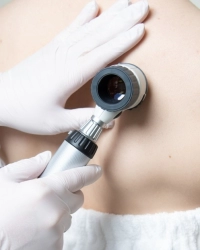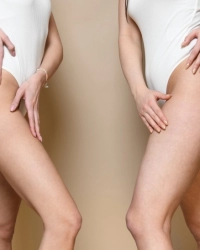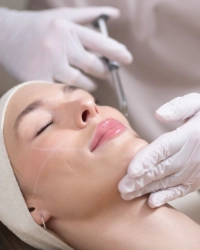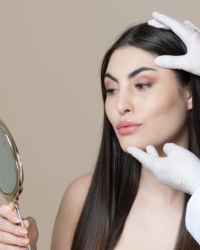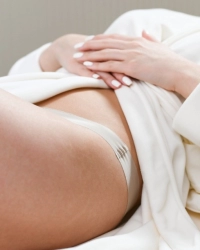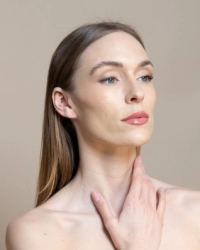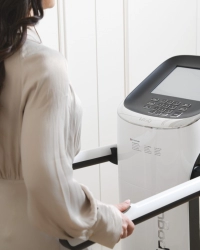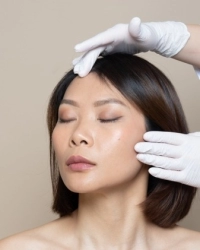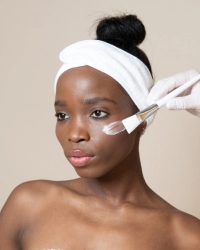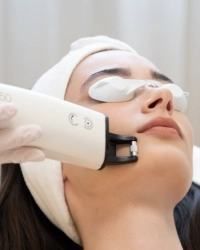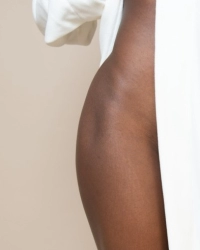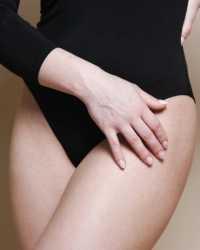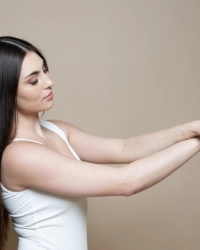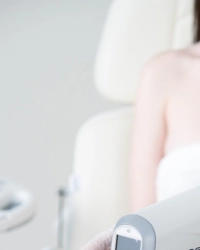IPL Photofacial for Acne
Red, inflamed and painful acne can be effectively relieved with IPL treatment - we use intense pulsed light energy to trigger the body's natural regeneration.
Intense Pulsed Light Therapy for acne
At some point in our lives we all experience pimples or acne, in most cases by the end of our teenage years it's no longer a problem. However, some people struggle with acne for many years.
Acne is a result of excessive sebum production: sebaceous glands become clogged and bacteria multiply as a result of the clogging, causing serious inflammation and infection in the skin.
The acne can be followed by scarring that can remain visible for months or years and even permanently. These can be treated with IPL treatment, which regenerates the skin tissue and eliminates inflammation.


The IPL treatment for acne
IPL is similar to laser treatment. However, lasers focus only one wavelength of light into the skin, while IPL emits several different wavelengths of light in a single pulse: between 570-1200 nm, allowing the entire treatment to be customized to your skin type and sensitivity. IPL light is more diffused and less focused than laser light. IPL penetrates the second layer of skin (dermis) without damaging the top layer (epidermis). The light energy is precisely controlled to penetrate the different layers of the skin without damaging the skin's surface.
How does acne develop?
Acne can appear for a number of reasons, which could be the following.
Hormonal problems
Increased production of androgen hormone (e.g. testosterone) can lead to excessive sebum production, which can result in acne. Similar problems can occur due to menstruation, pregnancy, climacteric and the use of contraceptive pills and other hormonal based methods. In recent years, an increasing number of gynecological diseases of hormonal origin have been recognised as being related to hormonal acne.
Oily skin
Hormone problems, stress or even incorrect facial care can cause oily skin. Basically, excess sebum is produced in the skin which, together with bacteria and dead skin cells can cause acne.
Bacteria
The bacteria P.acnes (Propionibacterium acnes) is a type of bacteria that lives on our skin and is basically harmless, being part of the skin microbiome. However, when these bacteria overgrow, it can cause acute inflammation in the skin and along with it, acne can develop or intensify.
Inflammation
Inflammatory processes can develop in the body for a variety of reasons, such as the immune system sending white blood cells as a "counterattack" in response to overgrowth of bacteria in the skin. This results in the red, swollen, inflamed, pus-filled nodules called acne.
Insufficient nutrition intake
The appearance of acne is also heavily affected by an unhealthy lifestyle. A lot of processed foods, dairy products and foods rich in fats and sugars can easily be the cause of acute acne. Various food allergies or intolerances can also cause inflammation in the body, which eventually manifests itself as acne.
A precise and spectacular solution for acne
With IPL (Intense Pulse Light) technology you can safely achieve highly effective and spectacular results when treating acne. The beam of light causes a targeted temperature rise in the treated areas, which: kills bacteria, reduces sebum production, reduces inflammation in the skin and triggers the body's natural regeneration.
Award-winning technology
Candela's Nordlys™ system was voted "Best Energy Device of the Year" at the 2022 Aesthetic Awards.

Procedure
At the very beginning of the procedure, the treated area is thoroughly cleaned of debris and make-up, and the birthmarks are covered. Protective eyewear must be worn throughout the treatment.
The IPL handpiece uses a broad-spectrum flashlight: high-energy pulses reach deeper into the skin and target the problem. The pulsed light helps to eliminate acne and acne scars, kill the bacteria that cause the problem and reduce inflammation in the skin.
The procedure can leave sensitive areas of the skin feeling tingly, burning and warm when exposed to the intense light. For this reason, a cooling gel is applied to the treated area to minimize the discomfort caused by the IPL.
At the very end of the treatment, the gel is wiped off and then a soothing cream is applied along with a broad spectrum SPF.
Prices
The consultation fee is always payable above the treatment price.
| Dermatological consultation and examination | 38 000 Ft /session |
| Aesthetic consultation with Observ 520X facial diagnostics | 15 000 Ft /session |
Appointment
Service
Selecting a location

Selecting a specialist

IPL treatment is recommended in the following cases:
- to reduce inflammation and treat active acne
- to reduce hyperpigmentation caused by acne
- to normalize sebum production
- reducing the appearance of enlarged pores
- improve the skin's protective barrier layer.
IPL treatment is mainly suitable for fair/medium skin and also for those with sensitive skin. For creole or darker skin, a consultation with a specialist is essential, where we will decide on the right treatment for the skin type and the problem.
Treating acne is a lengthy process, the number of treatments recommended depends on the severity of the problem, but we typically recommend 3-6 treatments. In addition to a series of treatments, it is important to identify the underlying cause of the internal problems behind acne and it is also essential to establish a proper home routine. After the third treatment, you will see a noticeable change in your skin, but the therapy can only provide a comprehensive result if it is complemented by a home skincare routine and also lifestyle changes, and the treatment of the underlying reasons.
A break of at least 4 weeks should be taken between treatments to allow the skin enough time to regenerate. To maintain the results, it is recommended to have 1-2 follow-up sessions per year.
The skin should be thoroughly prepared before the treatment: dead skin cells should be removed from the treated area at least 2 weeks before the procedure with a thorough exfoliation. It is important not to apply any exfoliating products to the skin after this. Avoid using any skin care products (e.g. face cream) on the day of the treatment.
Depending on your individual sensitivity, you may experience some mild swelling, redness and sunburn-like spots after the treatment, but these will disappear within a relatively short time.
During and after the treatment period, it is very important to protect your skin from the sun: a sunscreen with at least SPF 50 is recommended daily. Avoid saunas, hot baths for 10 days after the treatment. In addition, products containing acids and scrubs should not be used on the treated area for at least 2 weeks. A special soothing product is recommended after the procedure and it is important to have an acne-specific home routine. Solarium and tanning are not allowed during the treatment.
The treatment is not recommended during pregnancy, breastfeeding, menstruation, active skin disease, febrile illness, certain medical conditions, sun allergy and when taking photosensitising medication. In addition, tattoos, mechanical or chemical peels within 2 weeks prior to the procedure, or laser skin resurfacing within 1 month are also excluded.
